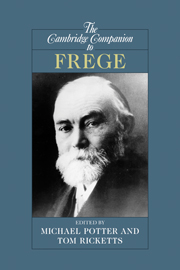Book contents
- Frontmatter
- 1 Introduction
- 2 Understanding Frege’s project
- 3 Frege’s conception of logic
- 4 Dummett’s Frege
- 5 What is a predicate?
- 6 Concepts, objects and the Context Principle
- 7 Sense and reference: the origins and development of the distinction
- 8 On sense and reference: a critical reception
- 9 Frege and semantics
- 10 Frege’s mathematical setting
- 11 Frege and Hilbert
- 12 Frege’s folly: bearerless names and Basic Law V
- 13 Frege and Russell
- 14 Inheriting from Frege: the work of reception, as Wittgenstein did it
- Bibliography
- Index
- Series List
6 - Concepts, objects and the Context Principle
Published online by Cambridge University Press: 28 September 2010
- Frontmatter
- 1 Introduction
- 2 Understanding Frege’s project
- 3 Frege’s conception of logic
- 4 Dummett’s Frege
- 5 What is a predicate?
- 6 Concepts, objects and the Context Principle
- 7 Sense and reference: the origins and development of the distinction
- 8 On sense and reference: a critical reception
- 9 Frege and semantics
- 10 Frege’s mathematical setting
- 11 Frege and Hilbert
- 12 Frege’s folly: bearerless names and Basic Law V
- 13 Frege and Russell
- 14 Inheriting from Frege: the work of reception, as Wittgenstein did it
- Bibliography
- Index
- Series List
Summary
In 1906, after giving up hope of vindicating logicism, Frege lists the results of his life's work that survive Russell's paradox. He begins:
Almost everything is connected with the Begriffsschrift. Concepts conceived as functions. Relations as functions with two arguments. Concept-extensions or classes are not primary for me. Unsaturatedness of both concepts and functions. The essence of concepts and functions recognized.
Twenty-two years earlier, in happier times, Frege took for his third guiding principle in Die Grundlagen der Arithmetik the admonition, 'never to lose sight of the distinction between concept and object'. We cannot understand Frege's view of his epochal achievements in logic - let alone mark the distance that separates his understanding of quantificational logic from contemporary views - without an appreciation of the concept-object distinction, the centrality Frege assigns to it and its connections to his other views. The distinction embodies the quantificational understanding of generality that Frege sets against older conceptions of logic. This quantificational understanding of generality gives Frege the principle for determining the logical segmentation of sentences and the contents or thoughts expressed by sentences. I hold that Frege’s Context Principle sets forth this connection between logical segmentation and quantificational generality.
Sections 1–3 lay out Frege’s concept–object distinction and its place in his philosophy of logic. Section 4 describes Frege’s introduction of higher-level concepts and his assimilation of sentences to proper names. Sections 5 and 6 explore the charge that the concept–object distinction incoherently undermines itself in the so-called Kerry paradox. Sections 7 and 8 discuss the bearing of the Context Principle and the concept–object distinction on Frege’s logicism.
- Type
- Chapter
- Information
- The Cambridge Companion to Frege , pp. 149 - 219Publisher: Cambridge University PressPrint publication year: 2010
- 10
- Cited by

